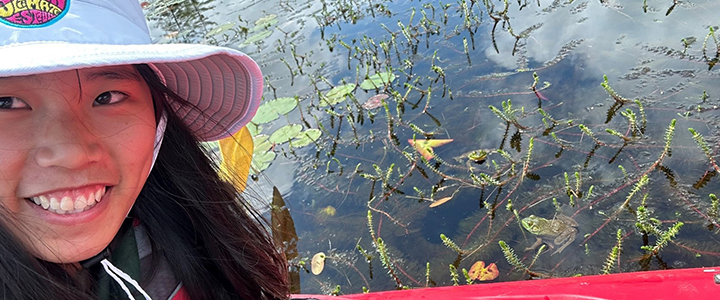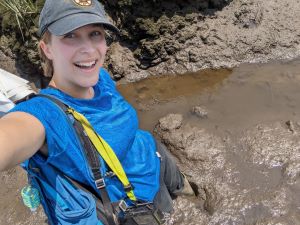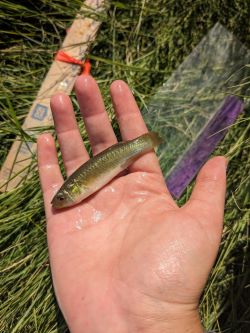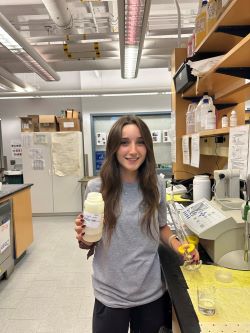
How I Spent My Summer Vacation: Select essays from the Watershed Management Bureau’s 2023 interns
Most people are familiar with the school essay ritual of writing up what we did over the summer once we are back-to-school. As a kid or young adult, my essays likely included the many hours of kick-the-can played in the backyard or the vacation our family took to Lake Winnisquam each summer. As I got older, the essays would have focused on less exciting times such as summer waitressing jobs. My essays pale in comparison to what college students and recent graduates who take advantage of unique internships, like the ones we provide at NHDES, could write.
NHDES hires approximately 40 interns each summer who work in a variety of the programs throughout the agency. The Watershed Management Bureau had 15 interns this summer working in the limnology lab, conducting public pool and spa inspections, responding to harmful algal blooms, and conducting river trend monitoring. Our summer interns play a critical role in supporting the Watershed Management Bureau’s programs. Without the interns, there would be fewer beaches sampled for bacteria, less outreach to the public about invasive aquatic plant monitoring, and less capacity in the lab to analyze the many samples received each day.
As a tribute to our interns, I have selected a few of their summer essays to highlight the dedication they bring each day to work and to share what they have learned about the important work the Watershed Management Bureau does each summer. Enjoy!
– Erin Holmes, Watershed Management Bureau Administrator
1. Merissa Silva Robertson
 Ahhhhh! You’re falling into a muddy hole! Oh wait, nope, that’s just me, Merissa Silva Robertson. You might ask me how I’ve landed, or more accurately, not landed myself in this position. As a recent graduate of University of New Hampshire with a degree in Wildlife Conservation Biology, I applied to the New Hampshire Department of Environmental Services as a Salt Marsh Monitor Field Technician. Lucky for me, I got the job! I now work for the NHDES Coastal Program with some awesome people. We monitor salt marshes that have previously been restored to assess changes in salinity concentrations, vegetative communities and fish populations. I had never worked in salt marshes before, so this position has allowed me to learn more about these unique coastal habitats. I have not only learned about the intricacies of salt marshes themselves, but also about the threats they face. These beautiful habitats are vulnerable to sea level rise, development and invasive species. Beyond the salt marsh work, I have learned about the network of organizations that work to conserve these coastal habitats. Whilst doing all this amazing conservation work, I have been conducting a study on how much mud I can cover myself with by walking through the marsh (hint: it is a lot). To any future salt marsh conservationist, might I suggest working on your jumping skills as the tidal creeks that run through these marshes require skill and technique to traverse. Unfortunately, that’s a skill I do not possess, hence the falling, which I am great at.
Ahhhhh! You’re falling into a muddy hole! Oh wait, nope, that’s just me, Merissa Silva Robertson. You might ask me how I’ve landed, or more accurately, not landed myself in this position. As a recent graduate of University of New Hampshire with a degree in Wildlife Conservation Biology, I applied to the New Hampshire Department of Environmental Services as a Salt Marsh Monitor Field Technician. Lucky for me, I got the job! I now work for the NHDES Coastal Program with some awesome people. We monitor salt marshes that have previously been restored to assess changes in salinity concentrations, vegetative communities and fish populations. I had never worked in salt marshes before, so this position has allowed me to learn more about these unique coastal habitats. I have not only learned about the intricacies of salt marshes themselves, but also about the threats they face. These beautiful habitats are vulnerable to sea level rise, development and invasive species. Beyond the salt marsh work, I have learned about the network of organizations that work to conserve these coastal habitats. Whilst doing all this amazing conservation work, I have been conducting a study on how much mud I can cover myself with by walking through the marsh (hint: it is a lot). To any future salt marsh conservationist, might I suggest working on your jumping skills as the tidal creeks that run through these marshes require skill and technique to traverse. Unfortunately, that’s a skill I do not possess, hence the falling, which I am great at.
2. Danielle Lucey
 My name is Danielle Lucey, and I spent my summer working for the Volunteer Lake Assessment Program (VLAP) as the Limnology Lab Intern. I graduated from Colby College this spring with majors in Mathematical Sciences and Chemistry with a concentration in Environmental Science. This has been my second summer working for NHDES, as I spent the summer of 2022 working in the same role. A typical day for me consists of calibrating meters each morning, preparing bottles for pickup, and handling the intake and analysis of the samples we receive throughout the day. I have learned how to test water for a variety of parameters such as pH, conductivity, turbidity and alkalinity and what levels of each are healthy for a lake. In addition to working primarily in the lab, I am fortunate to also have had the opportunity to do fieldwork. Approximately once a week, I performed a biologist visit where I accompanied VLAP volunteers at their lakes for monthly sampling to confirm the procedure and provide assistance. Through this internship, I have learned new methods of sample collection and analysis and have been able to witness firsthand the high level of passion and dedication that both volunteers and NHDES staff have for the protection of New Hampshire’s lakes. This has been a great experience and one that I would recommend to anyone interested in expanding their knowledge of lake ecology and the field and lab work used to monitor water quality.
My name is Danielle Lucey, and I spent my summer working for the Volunteer Lake Assessment Program (VLAP) as the Limnology Lab Intern. I graduated from Colby College this spring with majors in Mathematical Sciences and Chemistry with a concentration in Environmental Science. This has been my second summer working for NHDES, as I spent the summer of 2022 working in the same role. A typical day for me consists of calibrating meters each morning, preparing bottles for pickup, and handling the intake and analysis of the samples we receive throughout the day. I have learned how to test water for a variety of parameters such as pH, conductivity, turbidity and alkalinity and what levels of each are healthy for a lake. In addition to working primarily in the lab, I am fortunate to also have had the opportunity to do fieldwork. Approximately once a week, I performed a biologist visit where I accompanied VLAP volunteers at their lakes for monthly sampling to confirm the procedure and provide assistance. Through this internship, I have learned new methods of sample collection and analysis and have been able to witness firsthand the high level of passion and dedication that both volunteers and NHDES staff have for the protection of New Hampshire’s lakes. This has been a great experience and one that I would recommend to anyone interested in expanding their knowledge of lake ecology and the field and lab work used to monitor water quality.
3. Eva Switala
 I’m Eva Switala, and I’ll be going into my third year at Rochester Institute of Technology in New York, studying environmental science. This summer, I have been interning with Amy Smagula in the Exotic Species program. It’s been super fun, and I’ve learned a lot about aquatic plant identification, as well as the different levels of public interaction required to manage invasive species in the state. I’ve been really impressed by the adaptability and resourcefulness of everyone since the rainy summer has made fieldwork unpredictable. One of my favorite parts about this internship is the ability to go to so many parts of the state, especially as someone who has moved here recently. I’m always making notes of places I want to revisit in my free time.
I’m Eva Switala, and I’ll be going into my third year at Rochester Institute of Technology in New York, studying environmental science. This summer, I have been interning with Amy Smagula in the Exotic Species program. It’s been super fun, and I’ve learned a lot about aquatic plant identification, as well as the different levels of public interaction required to manage invasive species in the state. I’ve been really impressed by the adaptability and resourcefulness of everyone since the rainy summer has made fieldwork unpredictable. One of my favorite parts about this internship is the ability to go to so many parts of the state, especially as someone who has moved here recently. I’m always making notes of places I want to revisit in my free time.
4. Izzie Leo (pictured at top of article)
My name is Izzie Leo, and I am a recent graduate from the University of New England in Maine with an Environmental Studies major and a minor in anthropology. A Salt Marsh Monitor Field Technician has many perks, with spending the summer outside in a beautiful habitat being one of them. My peers and I refer to me as the local “Marsh Monster” since I often finish my field days covered in mud, water and bug bites, and smelling as if I was truly part of the hydrogen sulfide-rich ecosystem. However, the experiences and memories I have come to gain this summer far outweigh the itches of the bug bites and the stench. Collecting physical and biological data such as salinity, nekton [actively swimming aquatic organisms] and vegetation has been accompanied by many laughs and unforgettable moments. The days are always full of discovery, from abnormally large mummichogs, to great blue heron feathers, I always find myself gaining new insights from my work. Working in the Coastal Program, I have come to further appreciate the ecological services and understand the intricate ways in which salt marsh habitats serve all species.
While in the marsh I combine work, learning and fun into one experience. Since graduating from the University of New England, I have continually sought experiences to develop my knowledge. This opportunity has been a perfect balance between developing professional skills and expertise and exploring my interests. My favorite part of this position is how it blends into my personal life. Our discoveries in the field not only advance our understanding of these systems, but they also fuel my personal curiosity once I have returned home. Being a part of the NHDES Coastal Program has been an amazing opportunity which I will never forget. I am very much looking forward to the nostalgia that will be associated with this summer for the rest of my life.




